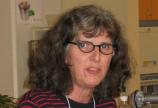Engaged scholarship and advocacy worthy of UVic’s highest faculty award
- Kaitlyn Rosenburg

If you don’t know what it means to be named a UVic Distinguished Professor, don’t fret: they’re a rare breed. The newest recipient, Dr. Susan Boyd, is only the 13th UVic professor to receive the award—the highest academic honour UVic can bestow on faculty—since its creation in 2002.
Boyd’s activist presence on substantive social justice and marginalization issues has led to a tremendous scholarly output.She’s authored eight books on topics related to drug law and policy, including her most recent, Killer Weed: Marijuana grow-ops, media and justice. One reviewer noted Boyd’s work is “highly novel and ground-breaking both in terms of methodology and topic, and as a result has garnered international attention.”
Her research focuses on drug law and policy, with an emphasis on the regulation of women who use criminalized drugs. Boyd has sought to change societal attitudes and policy by conducting research that includes the voices and experiences of women who use criminalized drugs, challenging conventional research and punitive policy, especially in the area of maternal drug use, collaborating with community groups most affected by policy, and advocating for change. “My research stems from the community work I do—striving with others for social justice and change,” says Boyd, who notes, “My work in the community has always informed my scholarly work and my teaching.”
Prior to Boyd’s academic career, she was an outreach worker in Vancouver’s downtown eastside. She saw daily how women, especially mothers, were negatively impacted by the intersection of harsh drug laws, social services and medical regulation. “I wanted to look more closely at policy, structural violence and power relations.” At that time, women who used criminalized drugs were seen as unfit mothers. And not all women were treated equally: poor women and First Nations women were more likely to have their infants permanently apprehended by the state—standard practice in BC up to the 1990s.
In 1991, Boyd became a co-founder of one of the first woman-centred harm reduction programs for women in the Downtown Eastside. The program sought to create a different model of care for infants born to mothers who used drugs. Drawing on research and programming then underway in Glasgow—which demonstrated that non-judgmental maternity services including health care, social and economic supports could improve birth outcomes—Boyd’s scholarly interests grew as a way to better understand and support the program’s activities. For Boyd, academic work offered a means to reveal how the effects of poverty and deprivation are often mistaken for the effects of drugs and how, myths, structural factors and punitive policies impact women and their children.
The community work that first propelled her still plays a central role in Boyd’s career, taking her to the BC Supreme Court this March to attend arguments in a charter challenge over the recent elimination of legal heroin for treatment purposes in Health Canada’s Special Access Programs.
Boyd noted that it was difficult to see lawyers for the federal government tap into “well worn out negative tropes” about people who use heroin and heroin-assisted treatment. She’s quick to mention Canada’s drug policy is punitive, class-based, gendered and racialized—making some groups of people more vulnerable to discrimination and arrest.
“Many researchers make valuable contributions to the improvement of health and security for people living in circumstances of social disadvantage —but few of those have engaged in that work as effectively as Dr. Boyd,” says Dr. Mary Ellen Purkis, dean of the Faculty of Human and Social Development. Purkis adds that few professors “have influenced so many graduate students to advance this important work, and few have committed themselves to developing networks that ensure the voices and experiences of those living in difficult circumstances are not only heard by policy makers, but that their experiences are taken into account in the development of new policy aimed at reducing social inequities.”
Boyd uses her work outside the university to enhance teaching in her courses, which include critical theory, research methodology and drug policy. “I really feel that my volunteer work complements what I do in the classroom and what I do with my students.”
Her students inspire her to learn. In return, Boyd hopes she’s instilled one thing: “A love of knowledge. Knowledge is actualized, it doesn’t just sit on a dusty shelf in the library. We can link activism to knowledge, and it becomes more available to everyone.”

